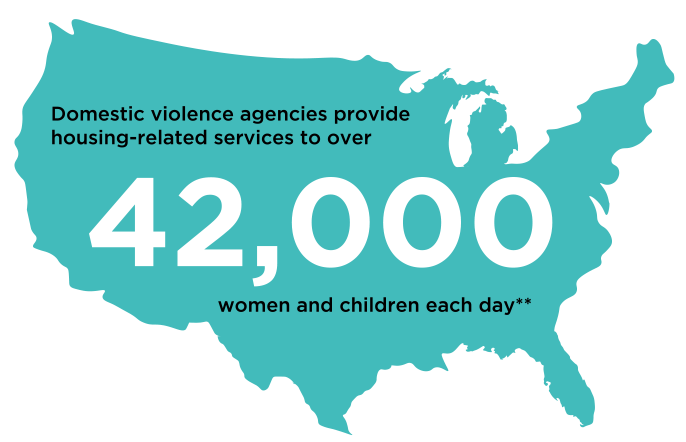About
Domestic violence transitional housing (DVTH) is a time-limited model offered by over 600 domestic violence programs across the United States. DVTH provides housing units and supportive advocacy services to build stability and support for survivors. Despite the widespread use of DVTH, programs remain largely untested for efficacy, creating a significant gap in our understanding of impactful housing for DV survivors. This national project seeks to understand DVTH program outcomes across individual, organizational, and community-level indicators.
NEED HELP? Contact the National Domestic Violence Hotline.


1 in 3
American women will experience domestic violence in their lifetime*

1 in 5
homeless women report domestic violence as the primary cause of homelessness†


Approximately 1 in 3 domestic violence programs provide transitional or other housing program (not including emergency shelter)†
Transitional Housing
6 months - 2 years
Temporary Emergency Shelter
Overnight - 90 days
Rapid Rehousing
6 months - 2 years
Permanent Supportive
Housing Ongoing
†Jasinski, J. L., Wesley, J.K., Mustaine, E., & Wright, J.D. (2002). The experience of violence in the lives of homeless women: A research report. US Department of Justice; 2005.
**National Network to End Domestic Violence (2020). 14th Annual Domestic Violence Counts Report. Washington, DC. Retrieved from: NNEDV.org/DVCounts.
*Smith, S. G., Zhang, X., Basile, K. C., Merrick, M. T., Wang, J., Kresnow, M., & Chen, J. (2018). The National Intimate Partner and Sexual Violence: 2015 Data Brief – Updated Release. Atlanta, GA: National Center for Injury Prevention and Control, Centers for Disease Control and Prevention, 2018.
More About the Study

A team of researchers from the University of Central Florida, University of Texas Medical Branch Center for Violence Prevention and University of Texas at Arlington plan to examine how domestic violence housing programs, specifically transitional housing, impact female survivors and their children and if they lead to safe, permanent housing and financial stability.
Funding Statement
This project was supported by Grant No. 2020-SI-AX-0010 awarded by the Office on Violence Against Women, U.S. Department of Justice. The opinions, findings, conclusions, and recommendations expressed in this publication/program/exhibition are those of the author(s) and do not necessarily reflect the views of the U.S. Department of Justice.
Learn More

To learn more about the Safe Transitions project or if your agency is interested in participating as a site, please contact us at safetransitions@ucf.edu.





